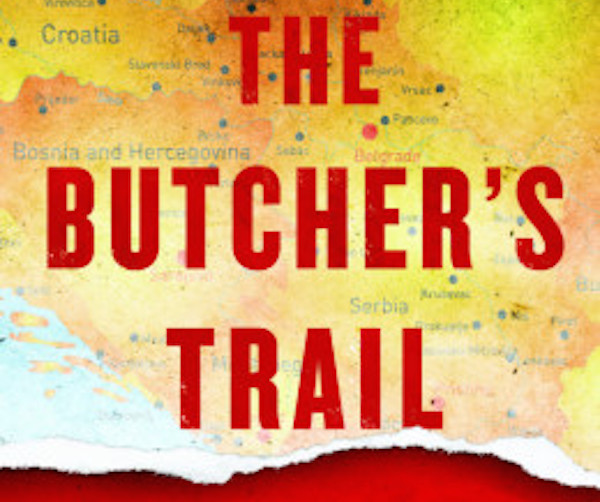Book Review: “The Butcher’s Trail” — A Masterful Account of Tracking Down Balkan War Criminals
Underlying all the thrills and chills, there is something deeply human about the moment when a person who has been murderously powerful is suddenly stripped of vainglory and led away to face justice.
The Butcher’s Trail: The Secret History of the Balkan Manhunt for Europe’s Most-Wanted War Criminals by Julian Borger. Other Press, 224 pages, $23.95.

by Ellen Elias-Bursać
Anybody who has the good sense to pick up a copy of this book will find it instantly fascinating. You needn’t know a thing about Yugoslavia, or, for that matter, about the International Criminal Tribunal for the former Yugoslavia (the ICTY), to be intrigued by the accounts of the international manhunts, told with masterful ease, about tracking down and capturing war crimes suspects, indicted for atrocities in the wars in Bosnia, Croatia, Kosovo, and Serbia. But the more you do know, the more you’ll learn. I, for instance, worked at the ICTY for over six years as a translator yet I still had much to learn on these pages about the backstories behind the cleverly laid traps that succeeded and the ones that were botched, about who ran the manhunts and why, and about how they shaped the politics of the Yugoslav successor states, and Europe, Russia, and the United States.
Julian Borger, the diplomatic editor for The Guardian, did his homework. He interviewed over two hundred people as he followed the trails of the fugitives and the teams of people tracking them. As a seasoned journalist he has an ear for a good story. Much of the book reads like a James Bond thriller, or at least as close to that as real life can come. There are even moments of light humor—really? a gorilla suit? Underlying all the thrills and chills, there is something deeply human about the moment when a person who has been murderously powerful is suddenly stripped of vainglory and led away to face justice. And the book dances around the darkness implicit in the contrast between the gallows-humor bravado of the special forces’ escapades and the tragedy of the wartime atrocities that savaged these communities.
The stories are enlightening for many reasons. Borger shows us how military men like David Petraeus got their start in Bosnia. Techniques for manhunts that first found their use in Panama, Colombia and Mogadishu were further refined in Bosnia only to become standard operating procedures in Afghanistan and Iraq. We learn of the tensions between the French and the British and the US over the organization of manhunts. The effort was a broadly international one: fugitives were caught by Polish, British, German, French, US special forces, with cooperation from intelligence and policing in Russia, Spain, Brazil, Argentina, and elsewhere. There were bounty hunters and ordinary police officers involved, and a tracking team of experts located within the ICTY. This focus on the role the international powers played during and after the war is a particularly valuable part of the book.
The first defendant was brought in to the dock in 1995. The story of the last arrest, in 2011, begins the book. And perhaps most incredible of all, this 16-year saga ended in a clean slate for the Tribunal: all the suspects who’d been indicted—160 men and one woman in all—were brought to justice. Borger offer fresh insight into the most high-profile arrests such as those of Slobodan Milošević, Ante Gotovina, Radovan Karadžić, and Ratko Mladić. I found even more engaging, however, the stories of lesser-known arrests: the general who was apprehended while at coffee in a Viennese hotel, for instance, or the police general who turned himself in “voluntarily” straight from his hospital bed after heart surgery, arriving in The Hague still in his pajamas. My personal favorite is the chapter about the internal tracking unit formed within the ICTY. This book is the first opportunity we have had to read about the many ways they contributed to the manhunts with their analyses and tenacity.

Julian Borger — he did his homework. Photo: Carlotta Luke.
In his last chapter, “The Legacy,” Borger reflects on the successes and failures of the Tribunal. As the men and woman who were convicted by the Tribunal return after serving their sentence they are given a hero’s welcome in their communities, with parades and cheering fans. Borger notes this with a sigh. “The war criminals are walking free again. Nationalism is on the rise and the memories of the dreadful past are being physically erased. Victims are being made to cower once more. For those who stood by while the crimes were committed and waved their flags on cue, it is more comfortable to imbibe the familiar nationalist bromides, reassuring themselves they were the true victims. The sound of the slogans blocks out the murmurs of the bones buried under their feet.” In summing up what the ICTY achieved, Borger says: “So after such an extraordinary achievement—the relentless pursuit of the accused until all 161 names on the Hague list had been checked off and the mission completed—what is there left as a legacy? Some justice was done. A few score of the guilty stood before the dock and were made to listen while the survivors recounted the bare facts. The convicted were deprived of some years of liberty. It’s not justice’s fault that this appears so paltry in face of such atrocious crimes. This is all it has to offer. That and a reasonable stab at the truth.”
The exhileration and adrenaline of the manhunts are long behind us now. Ahead lies the painstaking two-steps-forward-three-steps-back dance of building these societies into viable countries. I hope The Butcher’s Trail is translated into Albanian, Bosnian, Croatian, and Serbian. Borger’s compelling, readable prose with these stories of assault on impunity offer a rare opportunity to penetrate the “nationalist bromides” and “sounds of slogans” that continue to hold these countries back in ways that are tragic in all sorts of new, post-war ways.
I have only a few comments. First, the title. The word “trail” in the title of a book about trials is confusing. Second, perhaps there could have been a few pages devoted to comparing the ICTY manhunts to those of the International Criminal Tribunal for Rwanda (the ICTR). The ICTY and ICTR were set up as sister institutions, even sharing, in first years, the same chief prosecutor; the ICTR appeals chamber is housed in the ICTY building and ICTY judges sit with ICTR judges on ICTR appeals. I realize that a serious comparison of the two requires more than just a few comments, but nevertheless, more mention could have been made.
Other Press deserves credit for publishing this fascinating book, as well as Carla del Ponte’s Madame Prosecutor and Svetlana Broz’s Good People in an Evil Time (in my translation). A reader who reads first Broz’s book on the war in Bosnia and then Borger’s and del Ponte’s books on the ICTY will have an excellent foundation for understanding the complexities of the wars of the 1990s, the successes and failures of the International Tribunal for the former Yugoslavia, and the machinations of international politics and conflict that hold us to this day in their thrall.
Ellen Elias-Bursać has been translating novels, stories, and nonfiction by Bosnian, Croatian, and Serbian writers for the last twenty years. She has translated three books of David Albahari’s writing: Words Are Something Else, 1996, awarded the AATSEEL Award in 1998, for best translation from a Slavic or East European language; Gotz and Meyer, 2004 (Britain) and 2005 (US), awarded the National Translation Award by the American Literary Translation Association in 2006; and Snow Man (Canada) in 2005. She has also translated writing by Antun Šoljan, Dubravka Ugrešić, and Slobodan Selenić. She has co-authored a textbook for the study of Bosnian, Croatian, and Serbian with Ronelle Alexander, and has written a study on poet Tin Ujević and his work as a literary translator.
Tagged: Bosnia, Croatia, Ellen-Elias-Bursac, Julian Borger, Kosovo, Other Press, Serbia
